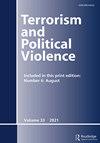Disengaged but Still Radical? Pathways Out of Violent Right-Wing Extremism
IF 2.1
2区 社会学
Q1 INTERNATIONAL RELATIONS
引用次数: 1
Abstract
ABSTRACT Research has overwhelmingly focused on pathways into violent extremism, but few empirically grounded analyses have examined pathways out of violent extremism. Even less is empirically known about the interactions between processes of disengagement and deradicalization from violent extremism. To address this gap, in-depth interviews were conducted with ten Canadian former right-wing extremists who were actively involved in violent racist skinhead groups, with interview questions provided by thirty Canadian law enforcement officials and ten local community activists. Participants were asked about their pathways out of violent extremism with a particular emphasis on processes of disengagement and deradicalization. Overall, our study findings highlight the multifaceted and multidimensional nature of pathways out of violent extremism as well as how radical beliefs persist beyond disengagement from violent extremism. We conclude with a discussion of the study limitations and avenues for future research.脱离但仍然激进?右翼暴力极端主义的出路
本文章由计算机程序翻译,如有差异,请以英文原文为准。
求助全文
约1分钟内获得全文
求助全文
来源期刊

Terrorism and Political Violence
Multiple-
CiteScore
5.60
自引率
8.30%
发文量
87
期刊介绍:
Terrorism and Political Violence advances scholarship on a broad range of issues associated with terrorism and political violence, including subjects such as: the political meaning of terrorist activity, violence by rebels and by states, the links between political violence and organized crime, protest, rebellion, revolution, the influence of social networks, and the impact on human rights. The journal draws upon many disciplines and theoretical perspectives as well as comparative approaches to provide some of the most groundbreaking work in a field that has hitherto lacked rigour. Terrorism and Political Violence features symposia and edited volumes to cover an important topic in depth. Subjects have included: terrorism and public policy; religion and violence; political parties and terrorism; technology and terrorism; and right-wing terrorism. The journal is essential reading for all academics, decision-makers, and security specialists concerned with understanding political violence.
 求助内容:
求助内容: 应助结果提醒方式:
应助结果提醒方式:


